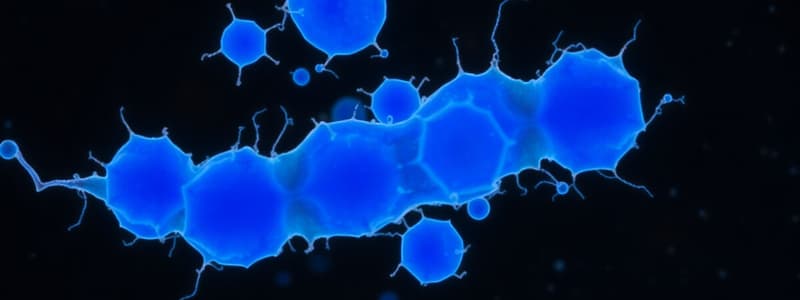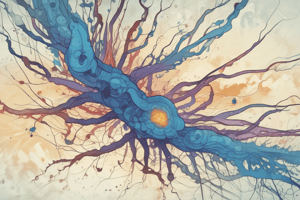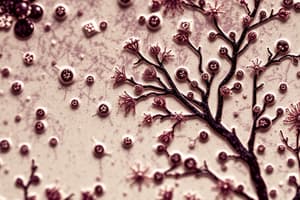Podcast
Questions and Answers
What is the purpose of the Ziehl-Neelsen method?
What is the purpose of the Ziehl-Neelsen method?
Which color indicates the presence of acid-fast bacilli, including Mycobacterium avium intracellulare, using this method?
Which color indicates the presence of acid-fast bacilli, including Mycobacterium avium intracellulare, using this method?
What type of fixative is NOT suitable for the detection of acid-fast mycobacteria?
What type of fixative is NOT suitable for the detection of acid-fast mycobacteria?
Why are alcoholic solutions of acid preferred over aqueous solutions for decolorization?
Why are alcoholic solutions of acid preferred over aqueous solutions for decolorization?
Signup and view all the answers
What is the final mounting medium used after the clearing steps in the procedure?
What is the final mounting medium used after the clearing steps in the procedure?
Signup and view all the answers
What is the color code for the background when using the Ziehl-Neelsen staining method?
What is the color code for the background when using the Ziehl-Neelsen staining method?
Signup and view all the answers
During the FITE acid-fast stain procedure, what temperature is applied for the hot solution phase?
During the FITE acid-fast stain procedure, what temperature is applied for the hot solution phase?
Signup and view all the answers
What is the primary purpose of using 0.1% eriochrome black T during the staining process?
What is the primary purpose of using 0.1% eriochrome black T during the staining process?
Signup and view all the answers
Why is it necessary to rinse sections in multiple changes of distilled water after staining?
Why is it necessary to rinse sections in multiple changes of distilled water after staining?
Signup and view all the answers
What color do mast cells appear after staining with the mentioned method?
What color do mast cells appear after staining with the mentioned method?
Signup and view all the answers
What color indicates the presence of Gram positive bacteria in the staining procedure?
What color indicates the presence of Gram positive bacteria in the staining procedure?
Signup and view all the answers
What is a characteristic result of the acid fast staining procedure?
What is a characteristic result of the acid fast staining procedure?
Signup and view all the answers
Which solution is used to decolorize the slides in the staining process?
Which solution is used to decolorize the slides in the staining process?
Signup and view all the answers
What is the preferred fixative used in the described staining procedure?
What is the preferred fixative used in the described staining procedure?
Signup and view all the answers
What is the primary purpose of this staining procedure?
What is the primary purpose of this staining procedure?
Signup and view all the answers
How should the sections appear after counterstaining with methylene blue?
How should the sections appear after counterstaining with methylene blue?
Signup and view all the answers
What is the purpose of deparaffinizing sections with a xylene-peanut oil mixture?
What is the purpose of deparaffinizing sections with a xylene-peanut oil mixture?
Signup and view all the answers
What color represents the background tissue in this staining protocol?
What color represents the background tissue in this staining protocol?
Signup and view all the answers
How long should the sections be stained with crystal violet?
How long should the sections be stained with crystal violet?
Signup and view all the answers
What should be the appearance of sections after differentiation with 1% acid alcohol?
What should be the appearance of sections after differentiation with 1% acid alcohol?
Signup and view all the answers
After staining with gram iodine, what is the next step?
After staining with gram iodine, what is the next step?
Signup and view all the answers
What color does the background appear when examining acid fast organisms under UV light?
What color does the background appear when examining acid fast organisms under UV light?
Signup and view all the answers
What should be used to mount the sections after staining?
What should be used to mount the sections after staining?
Signup and view all the answers
What happens to acid-fast bacteria during the staining process?
What happens to acid-fast bacteria during the staining process?
Signup and view all the answers
What is the primary purpose of using stain sections with schiff reagent?
What is the primary purpose of using stain sections with schiff reagent?
Signup and view all the answers
What are the primary components of the background stain in this procedure?
What are the primary components of the background stain in this procedure?
Signup and view all the answers
How long should sections be stained in aldehyde fuchsin?
How long should sections be stained in aldehyde fuchsin?
Signup and view all the answers
Which dye is used to stain mucin yellow?
Which dye is used to stain mucin yellow?
Signup and view all the answers
What is the purpose of rinsing the slides in distilled water after staining?
What is the purpose of rinsing the slides in distilled water after staining?
Signup and view all the answers
After how many changes of alcohol should the slides be dehydrated?
After how many changes of alcohol should the slides be dehydrated?
Signup and view all the answers
What color indicates the presence of conidia after staining?
What color indicates the presence of conidia after staining?
Signup and view all the answers
Which fixative is used in this staining procedure?
Which fixative is used in this staining procedure?
Signup and view all the answers
What is the purpose of rinsing slides in 1% sodium bisulfite?
What is the purpose of rinsing slides in 1% sodium bisulfite?
Signup and view all the answers
After preheating, how long should the slides be placed in the methenamine silver solution?
After preheating, how long should the slides be placed in the methenamine silver solution?
Signup and view all the answers
What color indicates that spirochetes are present after the staining process?
What color indicates that spirochetes are present after the staining process?
Signup and view all the answers
What should be the condition of the chromic acid solution for reuse?
What should be the condition of the chromic acid solution for reuse?
Signup and view all the answers
What step follows the 2% sodium thiosulfate treatment?
What step follows the 2% sodium thiosulfate treatment?
Signup and view all the answers
What color indicates the background after the staining process?
What color indicates the background after the staining process?
Signup and view all the answers
Which process should be done before mounting sections with synthetic resin?
Which process should be done before mounting sections with synthetic resin?
Signup and view all the answers
Which solution is recommended for checking adequate silver impregnation?
Which solution is recommended for checking adequate silver impregnation?
Signup and view all the answers
What is the purpose of the described method?
What is the purpose of the described method?
Signup and view all the answers
Which chemical is noted for oxidizing polysaccharides to aldehydes?
Which chemical is noted for oxidizing polysaccharides to aldehydes?
Signup and view all the answers
What role does sodium borate play in the procedure?
What role does sodium borate play in the procedure?
Signup and view all the answers
What is used as a toning solution in the described method?
What is used as a toning solution in the described method?
Signup and view all the answers
At what temperature should the silver nitrate impregnating solution be maintained?
At what temperature should the silver nitrate impregnating solution be maintained?
Signup and view all the answers
What is the purpose of using sodium thiosulfate in the procedure?
What is the purpose of using sodium thiosulfate in the procedure?
Signup and view all the answers
What is the function of hydroquinone in this staining method?
What is the function of hydroquinone in this staining method?
Signup and view all the answers
What type of fixative is used for the procedure?
What type of fixative is used for the procedure?
Signup and view all the answers
Study Notes
Special Stains for Microorganisms
-
Kinyoun Acid-Fast Stain: Detects acid-fast mycobacteria in tissue sections.
- Purpose: To identify lipoid-coated acid-fast organisms that resist decolorization.
- Principle: Acid-fast organisms retain carbol-fuchsin, unlike other organisms.
- Fixative: 10% neutral buffered formalin, preferred.
- Procedure: Deparaffinize, hydrate, stain with carbol-fuchsin, decolorize with acid alcohol, counterstain with methylene blue, dehydrate, and mount.
- Result: Acid-fast bacteria appear bright red, background is light blue.
-
Microwave Ziehl-Neelsen Method for Acid-Fast Bacteria: Alternative acid-fast stain using microwave energy.
- Procedure: Deparaffinize, hydrate, stain with carbol-fuchsin in a microwave, decolorize with acid alcohol, counterstain with methylene blue, dehydrate, and mount.
- Result: Acid-fast bacteria are bright red, background is blue.
Fite Acid Fast Stain for Leprosy Organisms
- Purpose: Detect Mycobacterium leprae in tissue sections.
- Principle: Leprosy organisms retain carbol-fuchsin.
- Fixative: 10% Neutral buffered formalin, preferred.
- Procedure: Deparaffinize, hydrate, stain in carbol-fuchsin, decolorize, counterstain with eriochrome black T, dehydrate and mount.
- Result: Leprosy organisms appear bright red, background is light blue
Microwave Auramine-Rhodamine Fluorescence Technique
- Purpose: Detect Mycobacterium tuberculosis or other acid-fast organisms.
- Principle: Uses fluorescence to enhance visibility.
- Procedure: Deparaffinize, hydrate, stain with auramine O-rhodamine B solution in microwave, dehydrate and mount using cover slip
- Result: Acid-fast organisms fluoresce reddish yellow, background is black.
Brown-Hopps Modification of Gram Stain
- Purpose: Differentiate between gram-positive and gram-negative bacteria in tissue sections.
- Procedure: Deparaffinize, hydrate, stain with crystal violet, gram iodine and basic fuchsin and differentiate in acetone/gallego solution, dehydrate and mount.
- Result: Gram-positive bacteria appear blue, gram-negative bacteria appear red, background is yellow.
Gridley Fungus Stain
- Purpose: Detect fungi in tissue.
- Procedure: Deparaffinize, hydrate, oxidize with chromic acid, stain with schiff reagent, stain with aldehyde fuchsin, counterstain with meta-nil yellow, dehydrate and mount.
- Result: Fungi appear deep purple, conidia as deep rose to purple, background as yellow.
Alcian Yellow - Toluidine Blue Method for H. pylori
- Purpose: Detect H. pylori in tissue sections.
- Principle: Alcian yellow stains mucin, Toluidine blue stains H. pylori and nuclei.
- Procedure: Deparaffinize, hydrate, stain with alcian yellow, stain with toluidine blue, dehydrate and mount
- Result: H. pylori appears blue, mucin appears yellow, background is blue.
Grocott Methenamine Silver Nitrate Fungus Stain
- Purpose: Identify fungi.
- Procedure: Deparaffinize and hydrate sections, oxidize in chromic acid, treat with methenamine silver solution, tone with gold chloride, remove unreduced silver, counterstain, dehydrate, and mount.
- Result: Fungi appear black, mucin as taupe to dark gray, background appears green.
Warthin-Starry Technique for Spirochetes
- Purpose: Detect spirochetes in tissue secretions.
- Principle: Spirochetes bind silver, treated with hydroquinone to visibly reduce silver.
- Procedure: Deparaffinize, hydrate, oxidize in chromic acid, treat with silver nitrate solution, reduce with developer, wash, dehydrate, and mount.
- Result: Spirochetes appear black, other bacteria also appear black, background is a pale yellow to light brown.
Dieterle Method for Spirochetes and Legionella Organisms
- Purpose: Detect spirochetes and Legionella organisms.
- Procedure: Deparaffinize, hydrate, treat with silver solution, develop with hydroquinone, wash, dehydrate and mount.
- Result: Spirochetes and Legionella appear black, background appears pale yellow to light brown.
Microwave Steiner & Steiner Procedure for Spirochetes, Helicobacter, and Legionella Organisms
- Purpose: Detect spirochetes, Helicobacter and Legionella using a microwave to enhance the silver impregnation.
- Procedure: Deparaffinize, hydrate, oxidize in chromic acid, place in silver nitrate solution in a microwave, reduce with developer, wash, dehydrate and mount.
- Result: Positive reaction shows organisms in dark brown/black, background is pale yellow to tan.
Perl's Prussian Blue Method for Hemosiderin
- Purpose: Identify hemosiderin (ferric iron)
- Procedure: Deparaffinize, hydrate, treat with acid ferrocyanide solution, wash, remove excess silver, counterstain, dehydrate, and mount.
- Result: Hemosiderin and ferric salts appear deep blue, other pigments retain natural color, tissue and nuclei stain in accordance with counterstain.
Leuco Patent Blue V Stain for Hemoglobin
- Purpose: Identify hemoglobin in peroxidase (RBCs and neutrophils).
- Procedure: Take sections to distilled water, stain with patent blue, counterstain with neutral red, dehydrate, and mount.
- Result: Hemoglobin peroxidase appears dark blue, nuclei appear red.
Gomori's Prussian Blue Stain for Iron
- Purpose: Detect iron pigments.
- Procedure: Immerse in hydrochloric acid and potassium ferrocyanide, wash, counterstain with nuclear fast red, rinse, dehydrate and mount.
- Result: Iron appears bright blue, nuclei appear red, cytoplasm pink/rose.
Turnbull's Blue for Ferrous Iron
- Purpose: Detect ferrous iron.
- Procedure: Deparaffinize, hydrate, treat with potassium ferricyanide solution, rinse, dehydrate, and mount.
- Results: Ferrous iron appears blue.
Modified Fouchet's Technique for Liver Bile Pigments
- Purpose: Identify bile pigments in liver.
- Procedure: Deparffinize, hydrate, treat with Fouchet's solution, wash, counterstain with van Gieson's solution, dehydrate, and mount.
- Results: Bile pigments appear emerald to blue, muscle appears green-yellow, collagen appears red.
Gmelin Technique for Bile and Hematoidin
- Purpose: Identify bile and hematoidin pigments.
- Procedure: Deparaffinize, hydrate, apply concentrated nitric acid to section to generate color changes, remove solution, observe color changes.
- Result: Bile pigments progressively change color from yellow-green-blue-purple, to red.
Fontana Masson Method for Melanin
- Purpose: Identify melanin.
- Procedure: Deparaffinize, hydrate, treat with silver solution, treat with thiosulfate, counterstain, dehydrate and mount.
- Result: Melanin appears black, argentaffin granules appear black, nuclei are red.
Modified Von Kossa Method for Calcium
- Purpose: Identify calcium.
- Procedure: Deparaffinize, hydrate, treat with silver nitrate solution, wash, dehydrate, counterstain, dehydrate, and mount.
- Result: Mineralized bone appears black, osteoid tissue appears red, nuclei appear blue.
Studying That Suits You
Use AI to generate personalized quizzes and flashcards to suit your learning preferences.
Related Documents
Description
Test your knowledge on Ziehl-Neelsen and FITE staining methods. This quiz covers critical concepts including the purpose of these techniques, color indicators, and proper procedures for detecting acid-fast bacilli. Perfect for students of microbiology wanting to solidify their understanding of staining methods.



